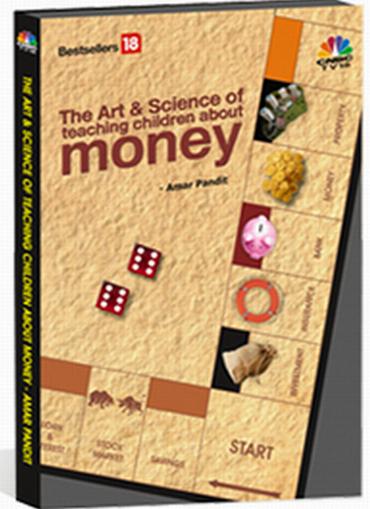
A parent does not have to be a CFO or a savvy money manager believes author columnist and financial planner Amar Pandit who in his second book The Art & Science of Teaching Children About Money deals with issues of teaching financial literacy to your children.
Don't try to make your kids the next Warren Buffet is the most important lesson he is trying to put forth through this book. "Common sense", which is not very common says he, "is your best friend when it comes to teaching financial literacy to your children".
Amongst other things the book deals with:
How to answer some of the uncomfortable questions children have?
Excerpts from the book:
Teaching kids to count is fine but teaching them what counts is best: Bob Talbert, American Columnist
This pithy quote gets to the core of teaching fiscal responsibility. If you look around, parents and teachers focus a lot on teaching counting and mathematics. There are even several types of teaching methodologies such as Vedic Maths and Abacus to enable kids have numbers at their fingertips from a young age. Parents of children as young as 4 are enrolling their kids in various esoteric classes so that their geniuses can get a 'head start' in life.
Many of us believe in teaching our kids as many skills as possible, be it arts or school subjects. But, how many of us actually remember that when our kids enter the real world, the first thing they will confront is money. Many of you probably give your children pocket money but what you don't realise is that this is not teaching them about the value of money or how to manage it. Amidst all the classes that we push our children to take, we forget an important life skill: Financial literacy. Although some schools touch upon economics or basic finance courses, no school is equipped to analytically teach financial literacy to your kids.
Most parents do not take an initiative in teaching their children about money. They might touch on the concept of piggy banks and savings early on but are usually reluctant to discuss the topic of money and family finances with their children. In the Indian context, money is a touchy issue and in terms of discussing sensitive topics, ranks as high as sex education; thus, it's not surprising that most parents are loath to discuss it. However, the best way to teach kids about money is to let them deal with money early on. They need to understand its power and the consequences of their decisions.
It's far better that they commit mistakes at a young age with smaller amounts than commit financial blunders when they grow up. They will thus experience handling their own money and making decisions around it. I believe this is a strong competitive edge that you can give your children for their future financial success.
The key learning points for kids should be:
Also, don't forget that even though you might not be teaching your kids directly, they are constantly learning by just observing you.
Barring the economic turmoil we have witnessed in the past year, we have been living in a period of economic prosperity, where salaries have increased year on year, and attrition due to better pay packages has increased. This prosperity also brings with it a tendency to spend and make financial decisions that may not be in one's best interests.
At the same time, we are also living in an era of unprecedented 'time poverty'. As a result, although it is imperative that we be financially literate -- and ensure that our families are financially literate as well -- many of us still do not know how to manage our money. Even today, making money is easier than handling or managing it with responsibility and tact.
In my experience as a wealth advisor to several families, I have witnessed blunders that smart people commit. Another problem that I see is when the second generation is not as motivated as the first generation to maintain and grow assets. They tend to be complacent about the wealth already created and don't always take prudent decisions. One of my clients had a legitimate concern, "My son is from IIM but I think he still does not understand the basics of personal finance. Just the other day he invested in an insurance policy that his friend sold him for a premium of Rs 30 lakh. He failed to see that there was a cost of 20 per cent in that particular product in the first year." My only reply to him was that the best schools do not teach many critical financial aspects such as evaluating life insurance policies or studying life insurance.
I see people commit several mistakes when it comes to their money whether in dealing with banks, taking loans, making investments, planning for their retirement and even in basic things such as creating a will. You may believe that you are already aware of these basics but let me ask you, "Have you made a will?" Chances are even though you may be very learned you have failed to do so. And even worse, you are not alone -- 98 per cent Indians do not have a will. This is because most people are not financially literate in such matters and do not even think about a will until they are 60-65 year old.
Click NEXT to read what exactly is financial literacy.

Financial literacy means understanding:
I am very passionate about financial literacy and strongly believe it must be taught at a very young age. This is because as kids grow into teenagers they develop strong habits and become hardwired because of peer pressure and the external environment. Beyond the 6th grade, children are subject to severe peer pressure and then it becomes difficult to get them to adhere to a financial literacy programme. By then they would want to buy mobile phones, gadgets, branded clothes and do many things that their friends are doing. Telling them to act sensibly and responsibly might be a tall order if you have not inculcated good habits early on. Once they cross their teens and work for a couple of years they start seeing the value of a good financial literacy programme.
In my experience, kids between the age of 5 and 12 are very receptive to financial literacy and hence the best age to start the programme is 5 to 12. This is not to say that children above 12 do not appreciate financial literacy. They certainly do when the content is interesting but it just takes a little more time for them to understand the importance because they have developed certain habits and are consumers by that age. In their teens, most children will first want to try and experience things before they adopt it. Additionally, they want something just because their friends have it.
Click NEXT to read the mantras you must follow when teaching financial literacy to your kids.

There will be constant demands, or hunger strikes or emotional blackmail that most parents will be exposed to at some point of time. You must understand that it's natural for them to sometimes behave like this and is a part of growing up. The best part is that you can still teach them to be savvy savers, spenders, investors and givers. You do not have to be a savvy finance manager or a CFO to teach your kids. Common sense, some practical ideas and the experience of other parents from this book is all you need to start teaching your children about money.
You must give your children a framework to make prudent financial decisions. Parents know their children best and they must use this advantage to teach simple yet powerful lessons to children.
There are often many real-life situations when you can teach your kids about money, considering that money is an integral part of our daily life. Whenever you buy groceries or petrol or even pay school fees, you can teach children. If you have taken your son to an ATM, and he insists on pressing all the buttons like most kids, take this opportunity to discuss a few things about ATMs. Besides this, you can always set aside time to teach them the basics of money management. If you cannot, then you must seek professional help. It is far better to spend some money on financial education than allowing your children to develop irresponsible and dangerous money attitudes, behaviours and habits.
Finally, we all know that learning is a life-long process and financial literacy is no different, as the needs and situation of a family keep on changing. In most cases, the financial situation of a family would be stable for several years and then change radically for reasons such as birth, inheritance, divorce, deaths and losses.
Mantras to follow:
Remember the adage that a fool and his money are soon parted. Hence, the best and most meaningful gift for your children is the gift of financial literacy.